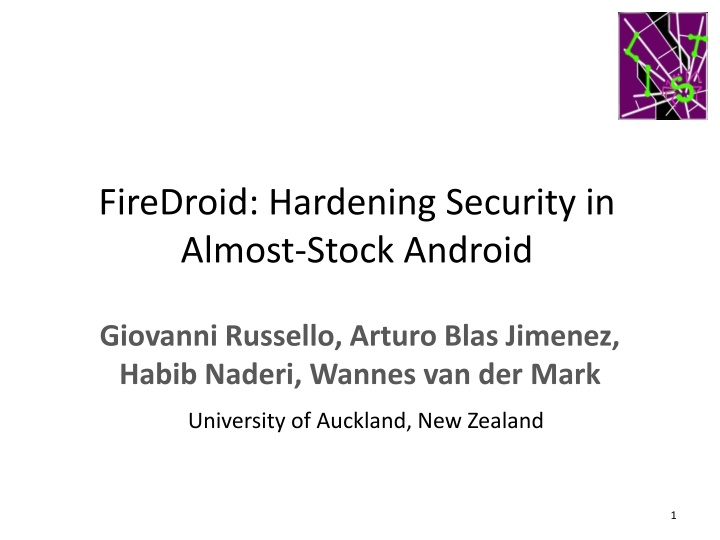
FireDroid: Hardening Security in Almost-Stock Android - Overview
"Explore the comprehensive roadmap, system design, implementation, and security policies of FireDroid for enhancing the security of almost-stock Android devices. Learn about the motivation, desired system modifications, and system design observations to protect against evolving malware threats."
Download Presentation

Please find below an Image/Link to download the presentation.
The content on the website is provided AS IS for your information and personal use only. It may not be sold, licensed, or shared on other websites without obtaining consent from the author. If you encounter any issues during the download, it is possible that the publisher has removed the file from their server.
You are allowed to download the files provided on this website for personal or commercial use, subject to the condition that they are used lawfully. All files are the property of their respective owners.
The content on the website is provided AS IS for your information and personal use only. It may not be sold, licensed, or shared on other websites without obtaining consent from the author.
E N D
Presentation Transcript
FireDroid: Hardening Security in Almost-Stock Android Giovanni Russello, Arturo Blas Jimenez, Habib Naderi, Wannes van der Mark University of Auckland, New Zealand 1
Roadmap Introduction System Design Implementation Security Policy Evaluation Discussion of EMM 2
Permission System Declares the permissions requested Agree as all-or-nothing upon installation Access Control Mechanism similar with traditional Linux 4
Motivation Big market share of Android (87% worldwide, 2013) Big number/increment of malware (97%, 2013) 5
Motivation Rapid evolution of malware Commercial tools fail to detect 21% of malwares Inflexible security mechanism/policy enforcement of Android 6
Desired System Light modification of OS No recompilation of middleware and OS Enforce security policies in Native Code Layer Not rely on user 7
Roadmap Introduction System Design Implementation Security Policy Evaluation Discussion of EMM 8
System Design Observation Privacy-related depends on low-level system call Challenge Map high level policies to those enforced at low- level : policy language No modification on application, middleware, Linux to interpose system calls: ptrace() 9
Architecture 10
Roadmap Introduction System Design Implementation Security Policy Evaluation Discussion of EMM 11
System call interposition ptrace() could monitor a process when the monitoring process is the parent process Android s Zygote process First start on boot process Fork all the other applications process 12
System call interposition (cont d) Monitoring process starts earlier than Zygote Modify the configuration file init.rc Need to get the root privilege No need to recompile the OS image (light modification) On-the-air update disable FireDroid? Modify init.rc Disable ptrace() 13
System call interposition (cont d) Avoid side effects caused by system call interposition Incorrectly replicating OS semantics Race conditions Denying system calls Android memory sharing 14
System call interposition (cont d) Avoid side effects caused by system call interposition Incorrectly replicating OS semantics 6 = socket(UDP, ) 7 = socket(TCP, ) close(7) dup2(6,7) bind(7, port 80) 15
System call interposition (cont d) Avoid side effects caused by system call interposition Race condition A: write to /tmp/foo, /tmp/bar, read tp /tmp/baz /tmp/foo symbolic link to /tmp/bar B: removes /tmp/foo, create a new symbolic link /tmp/foo to /tmp/baz A get write permission to /tmp/baz Android memory sharing Policies on file descriptors to ashmem/ION shared memory regions 16
Security Policies Requester Operation [param-list] on Target [if condition] then outcome [do action] outcome: allow, deny, kill, ask do action: invoke functions in Android layer 17
Roadmap Introduction System Design Implementation Security Policy Evaluation Discussion of EMM 18
Security Validation Execute malware inspect system log set up security policies Execute malware Financial Charges SMSLimit = 10 App -> numofSentSMS = 0 contact = getContact() if (App.numOfSentSMS > SMSLimit) thenask if (!contact.contains(destNum)) thenask if (destNum.length <= 7) thenask if (ask.outcome == allow) do App.numOfSentSMS++ App|PackageManager registerReceiver [intent, priority] on ActivityManager if (intent == SMS_RECEIVED) && (priority == highest) then allow do set (priority, LOWEST) 19
Information Harvesting App get [code] on iPhoneSubInfo if (code == IMEI) thenallowdo replace(fakeIMEI) and notifyUser(imeiMessage) if (code == IMSI) thenallowdo replace(fakeIMSI) and notifyUser(imsiMessage) if (code == ICC) thenallowdo replace(fakeICC) and notifyUser(iccMessage) if (code == PHONE_NUMBER) thenask App query on ContentProvider if (call_log/calls) thenask if (sms/inbox || sms/sent) thendenyand notifyUser(stoedsmsMessage) 20
Vulnerabilities RATC Keep forking new processes Reach the maximal number of allowed user process Kill adb daemon adb restarted as a root process numOfForked = 0 delta = 10 App fork on System if (numOfForked < userProcLimit() - delta) thendeny 21
Vulnerabilities exploid NETLINK message to create a user-controlled copy of the init process Protocol set to NETLINK_KOBJECT_UEVENT Get the root privilege App socket [domain] on System if (domain == PF_NETLINK) thendeny perf_event_open Execute segment of code with negative index to the user process App perf_event_open [attr] on System if (attr.config < 0) thendeny 22
Performance penalty Configuration: HTC One X, Android 4.0.3 (Ice Cream Sandwidch), Linux 2.6.39.4 kernel Quadrant: overall evaluation by computationally- intensive applications BenchmarkPi: overhead in CPU 23
Performance penalty Interact with other applications Invoke Android API Battery consumption 496 mins without Firedroid, 480 mins with Firedroid 25
Roadmap Introduction System Design Implementation Security Policy Evaluation Discussion of EMM 26
FireDroid Pros: Unmodified apps any app including built-in system apps No modification and recompilation of OS or middleware Completely Handle Native Code Cons: Need root privilege of device (modify the init.rc file) Performance penalty and battery consumption Security policy not so flexible, only allow/deny 27
App Rewriting + API hooking Disassembles apps, rewrite them and hook the security-sensitive APIs to enforce behavior (e.g. open(), read()) Pros: Much more flexible security policies (app-level granularity) No need to root the device, no modification on OS Handle Native Code Cons: Need to installed modified version of app Not able to monitor the system/preinstalled apps 28
Thank you! Questions? 29
